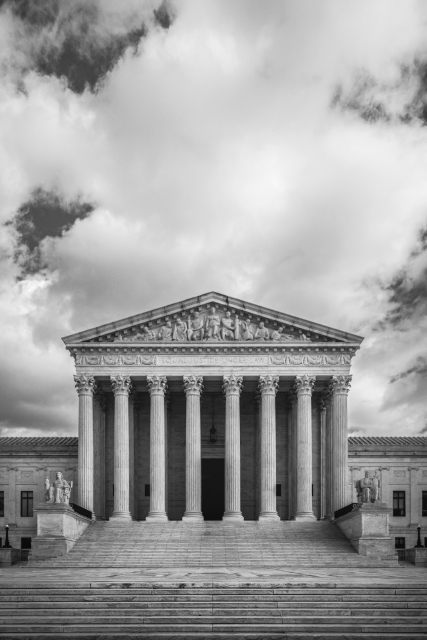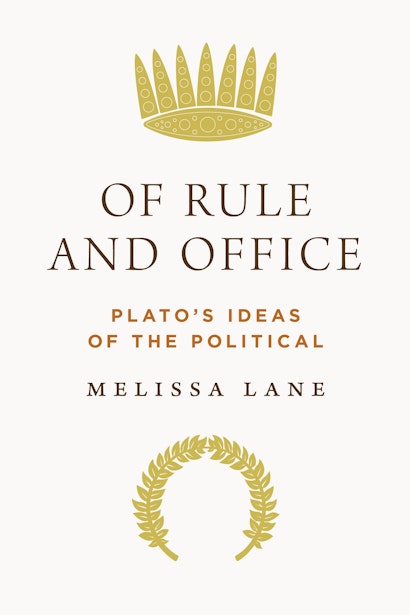A cabal of unelected men and women appointed with tenure for life, making the most important decisions for an entire society with no chance of appeal. That is a good description of the United States Supreme Court. It’s also a good description of the philosopher-rulers of Plato’s Republic. But while many have suggested holding Supreme Court Justices as accountable as other US federal judges, Plato went further in seeking to guard against abuse by unelected rulers. His Republic suggests grounds for imposing uniquely demanding standards on members of the Supreme Court.
Like us, Plato lived in an age of political constitutions: he grew up in democratic Athens (apart from two brief oligarchical interruptions, after each of which a democratic constitution was reestablished). While the Greeks did not have singular founding constitutional documents, they spoke of bodies of ancestral law that served a similar function: the “laws of Lycurgus” in Sparta, the “laws of Solon” in Athens, and so on. The ancient Greek world in the late fifth and early fourth centuries BCE featured many oligarchies as well as many democracies, all of them constitutionally governed in the sense that they were ruled by officeholders with limited powers, serving for limited terms, chosen either by election or by lottery, in a polity governed by laws.
These officeholders were typically held accountable at the end of their term of office by being subject to audits (known as euthunai). In most constitutions, these covered financial conduct with public funds during a term of office; in democratic Athens, they were extended to cover any and all acts of malfeasance during the term of office. But what about those special boards of officeholders themselves who were to conduct the audits? Who would hold them accountable? In democratic Athens, the incoming board of auditors would conduct the audits on their predecessors. But end-of-term audits could only go so far to forestall bad behavior while in office. And if selection procedures were imperfect, ignorant or corrupt people could get to exercise power in the first place.
In two dialogues, the Republic and the Laws, Plato puts his finger on these vulnerabilities in standard constitutional measures of accountability, and he experiments with different ways in which its purpose might be better achieved. This may sound surprising, especially regarding the Republic. Was he not simply turning his back on constitutional accountability in proposing there that philosopher-kings and -queens should rule? (His text is explicit that qualified women should be political equals to qualified men.)
Popular readings of the Republic assume that Plato was in favor of absolutist and unconstrained rule, believing that he was concerned only “to get this power into the best hands” (as Karl Popper put it in tracing totalitarianism back to Plato). But consider what Plato’s character Socrates prescribes for the rulers he envisages: “none of them should acquire any private property that is not wholly necessary…none of them should have a house or treasury into which anyone who wishes cannot enter…for them alone in the city, it is unlawful to touch or handle gold or silver.”
Instead, the rulers of the ideal republic must live on subsistence wages and forsake family life. This is to ensure that rulers will see the ordinary citizens they serve as their “paymasters” and “providers”: that they will see themselves as public servants hired to do a job for the citizens, rather than as deities above society. And all of this, Plato says, should be established “as a law.”
These laws are needed to govern even the wise and the just. Plato already assumed that the rulers of the republic had achieved extraordinary levels of wisdom and virtue (that is what being a philosopher meant for him). Yet Plato believed that the more unaccountable an elite—and the greater their powers—the more society needed to rein them in. Without strict legal constraints, the rulers won’t be guardians, but exploiters: “if they acquire private land, houses, and currency themselves, they’ll be…hostile masters of the other citizens instead of their allies.” Wisdom and virtue do not exempt them from legal constraints on their personal life.
What would Plato say about Supreme Court accountability today? Forbidding the Justices any private wealth and any family ties may be a non-starter. But the idea that they should be forced to live on their wages alone is germane. Why should Supreme Court Justices be allowed to earn speaking fees or receive gifts at all? The unique power that the Justices wield for life and their insulation from ordinary forms of accountability justifies a public demand that they disown corruption and even its appearance. Likewise, the Justices’ spouses and partners (who receive reflected honor yet also bring corrupting dangers) could be expected to meet higher disclosure requirements and keep their earnings in a blind trust during their spouse’s time on the bench.
To be sure, it might be objected that these rules will deter talented people from wanting to serve on the Court. But Plato already had the right answer to that: he explained the only rulers whom one can trust are those who aren’t motivated by wanting power and privileges in the first place. Imposing strict deprivations on the Justices would screen out those who want not only unchecked power but also a virtually unlimited payday.
At the same time, it is right and beneficial that honorable service in a role that is the linchpin of constitutional government should receive public honor and admiration. Both the Republic and the Laws build in such honors both in life and after death (in the case of the Laws, not for philosopher-rulers but for the auditors whose role was to hold all the other officeholders to account). But the dialogue emphasizes that these honors only go with proper fulfillment of the office. If an auditor acts improperly, they should be stripped of these honors. The honors go with the behavior, not just with the role. Those who violate the spirit of their public trust do not deserve the honors of their office. It is up to us to take seriously what those ideas suggest.
In short, Plato knew that all guardians need guarding. That’s why he insisted that the price of their power must be to prescind from the usual perks. Otherwise, public servants will see themselves as the public’s masters. Until the wealth of Justices is seriously restrained, American democracy will continue to do less to protect against the abuse of power than Plato gave reason twenty-five hundred years ago to do.
Melissa Lane is the Class of 1943 Professor of Politics and a faculty member of the Program in Classical Philosophy at Princeton University. She is also the 50th Professor of Rhetoric at Gresham College. Her books include Eco-Republic: What the Ancients Can Teach Us about Ethics, Virtue, and Sustainable Living and The Birth of Politics: Eight Greek and Roman Political Ideas and Why They Matter (both Princeton) and Method and Politics in Plato’s “Statesman.”

